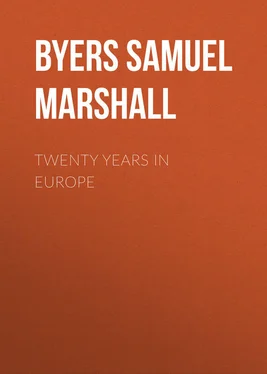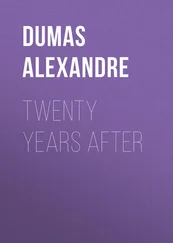Samuel Byers - Twenty Years in Europe
Здесь есть возможность читать онлайн «Samuel Byers - Twenty Years in Europe» — ознакомительный отрывок электронной книги совершенно бесплатно, а после прочтения отрывка купить полную версию. В некоторых случаях можно слушать аудио, скачать через торрент в формате fb2 и присутствует краткое содержание. ISBN: , Жанр: foreign_prose, foreign_antique, foreign_language, на английском языке. Описание произведения, (предисловие) а так же отзывы посетителей доступны на портале библиотеки ЛибКат.
- Название:Twenty Years in Europe
- Автор:
- Жанр:
- Год:неизвестен
- ISBN:http://www.gutenberg.org/ebooks/44296
- Рейтинг книги:4 / 5. Голосов: 1
-
Избранное:Добавить в избранное
- Отзывы:
-
Ваша оценка:
- 80
- 1
- 2
- 3
- 4
- 5
Twenty Years in Europe: краткое содержание, описание и аннотация
Предлагаем к чтению аннотацию, описание, краткое содержание или предисловие (зависит от того, что написал сам автор книги «Twenty Years in Europe»). Если вы не нашли необходимую информацию о книге — напишите в комментариях, мы постараемся отыскать её.
Twenty Years in Europe — читать онлайн ознакомительный отрывок
Ниже представлен текст книги, разбитый по страницам. Система сохранения места последней прочитанной страницы, позволяет с удобством читать онлайн бесплатно книгу «Twenty Years in Europe», без необходимости каждый раз заново искать на чём Вы остановились. Поставьте закладку, и сможете в любой момент перейти на страницу, на которой закончили чтение.
Интервал:
Закладка:
“My wife and myself speak often of you both and of the friendly reception we met at your hands. May we indulge the hope of returning it soon, on your visit to Paris?
“I would have been glad to make General Sherman’s acquaintance, but, unfortunately, I found no opportunity to do so.
“Mrs. Louis Blanc and nephew unite with me in kindest regards to Mrs. Byers and yourself. Most sincerely yours,
“Louis Blanc.”September, 1872. -All this past summer the international arbitrators at Geneva have been trying to settle our difficulty with England over the Alabama pirate business. Our Mr. Evarts has won great honor in his management of our side of the matter. Still we have virtually lost the case. A few days ago, the 14th, the treaty was signed. True, it gives us fifteen millions, but we set out with claiming two hundred and fifty millions. What a bagatelle to have to accept after that. The testimony really tends to show that the Rebels never hurt the North with their cruisers a hundredth part as much as everybody supposed they had. It was only a little Captain Kidd sea robbery after all.
It is something, however, to make England come to time, if only a little, for only the other day a London paper declared England will never pay the Yankees a dollar, no matter what the arbitrators say. We shall see.
CHAPTER VI
1872
We spent this summer of 1872 at beautiful Bocken, an old castle-like chateau, sitting high above the lake, ten miles out from the city. It was once the home of the Zurich burgomasters, at the time when they exercised the authority of petty kings. The scene from Bocken is very grand. The chateau, with its big hall of knights, its old oak-paneled dining-room, its brick-paved corridors and leaded, round-paned windows, is very interesting. Paid 600 francs for the use of rooms all summer, and reserved the right to return other summers. The days were fair, and it seemed to me I had never seen so many clear, moonlight nights. The lake, shining in the clear moonlight, lay 1,000 feet below us, and, at times in the night, we could even faintly see the snow-covered mountains of Glarus. It was a delightful summer at Bocken, and our joy was doubled by the coming of our firstborn.
More than one of this summer’s excursions was to the scene of the Tell legends on Lake Luzern. I knew the legends were already being doubted, even by some of the Swiss, but I hoped, by diligent searching among certain half-forgotten archives in the old arsenal at Altorf, to find something new. I was not wholly disappointed; I saw a musty document there that told of the building of the chapel to Tell on the “Axenstrasse.” That was in 1388, only thirty-one years after Tell’s death . The document gave the amount of wages paid to hands, the amount of wine furnished the workmen, and a statement that one hundred and fourteen persons who had known Tell were present at the dedication. On the supposed spot of Tell’s birth, another stone chapel was erected in 1522. There is also in this museum a copy of a proclamation of four hundred and ninety-four years ago, by the Council of Uri, ordering all good Christians and patriots to make yearly pilgrimages to Burglen, because it was the birthplace of William Tell. This document was discovered in 1759, but was burned up in a fire at Altorf, about 1779. The copy, however, is regarded as genuine. The question arises, why did a poor little village community ever go to the expense of building these chapels, if they had no certain knowledge of the existence of their hero, and why were the citizens making these excursions to Tell’s birthplace at that early time?
In this old arsenal at Altorf are preserved the battle flags borne by the Swiss at Morgarten in 1315, only eight years after the death of Tell. The genuineness of these flags historians have not doubted. Neither is the old Swiss story of that battle in dispute. If the ancient Swiss could know of this battle, and save their flags, why should they not also know the facts as to Tell, at the time they were building chapels to him? If they do not, these chapels remain as monuments to the utter foolishness of a people.
The tradition as to his shooting an apple from his boy’s head is of no earthly consequence; true or untrue, it has no more to do with the Swiss patriot’s having served his country than the story of the cherry tree has to do with the patriotism of Washington. Tyrants, compelling enemies to tests of archery under great risks, were nothing uncommon in even other lands than Switzerland, and even this little incident in Tell’s life may have been true. For myself, I am satisfied that a patriot named William Tell existed, and that his hot-headed love of freedom, and his recklessness, precipitated a revolution in the Alps. In these later days his killing even a tyrant would probably brand him as a common freak or an assassin. Time and history mollify many things.
The chapel at the Axenstrasse was about to fall into the lake, while I was in Switzerland. Its restoration was decided on. Knowing that I had interested myself in the Tell traditions, and at my request, the authorities allowed me to take away the stone step in front of the old altar, to place in the Washington monument. I secured official testimony as to the block, had a proper inscription put on it, and sent it to Washington as a souvenir of Switzerland’s greatest tradition. It is now in the Smithsonian Institution, being regarded too valuable a relic to hide away in the monument.
Now that we could speak the language, we made delightful excursions to the mountains. I had determined to write a book on Switzerland, 1 1 “Switzerland and the Swiss.”
and regarded it necessary to see, not only the Alps, but Alpine village life, and everything characteristic of the country. The result was that we went on foot to almost every valley and village, and climbed not a few of the famous mountains. I now became a member of the Alpine Club. The Rigi we climbed oftenest of all. There was no such thing as riding up, no easy railway carriages, then. People climbed mountains on foot, and the names burned on our Alpine stocks had a meaning. Many and many a Saturday noon we took the train at Luzern, climbed up the Rigi through the woods alone, on the Arth side, and stayed there till Monday morning. We usually got to the top in three hours. Daylight of Sunday saw us out on the high plateau, looking at that great sight, the rising of the sun in the Alps.
Living among the mountains was glorious then, and cheap . Many a time, in those days, we have had lodgings and meals at four francs a day, at the Rigi Staffell, where once the poet Wordsworth tarried. And at Michaels Kreutz, a height near by, two and one-half francs for pension was our usual expense. We traveled much in second-class cars. Everybody did this, and we were in the mode. Often when I was alone in the mountains, I went third-class even, and was as well off for sightseeing as I would have been in a Pullman palace car.
The Alpine views from the Rigi in good weather are almost beyond description. One must see them to realize their splendor. Chains of snow mountains are in the distance, and thirteen blue lakes shining at the Rigi’s foot. It is only six thousand feet high, but unsurpassed as a point for seeing Swiss scenery.
Sometimes I went up Pilatus alone. It is higher than the Rigi, and near by. The climb was five hours, and I always slept in the little Senn hut, with the cowboys. The cattle, with their tinkling bells, occupied half the stone building. Cool autumn nights I have sat there till midnight, talking with the cowboys, before a big fire made of dried Alpine rose bushes. There were simply acres of roses on Pilatus then, and the Senns were glad to get rid of the shrubs by burning them. I never felt in such perfect health in my life, as in the bracing air on Pilatus Mountain, and the fact that tourists never knew the way up there made life among the goats and the roses immensely enjoyable. For years, ever since my imprisonment in the South, I had suffered horrors with headaches and migraine. These frequent stays in the air of the higher Alps were slowly curing them.
Читать дальшеИнтервал:
Закладка:
Похожие книги на «Twenty Years in Europe»
Представляем Вашему вниманию похожие книги на «Twenty Years in Europe» списком для выбора. Мы отобрали схожую по названию и смыслу литературу в надежде предоставить читателям больше вариантов отыскать новые, интересные, ещё непрочитанные произведения.
Обсуждение, отзывы о книге «Twenty Years in Europe» и просто собственные мнения читателей. Оставьте ваши комментарии, напишите, что Вы думаете о произведении, его смысле или главных героях. Укажите что конкретно понравилось, а что нет, и почему Вы так считаете.



![О Генри - Через двадцать лет [After Twenty Years]](/books/415401/o-genri-cherez-dvadcat-let-after-twenty-years-thumb.webp)








